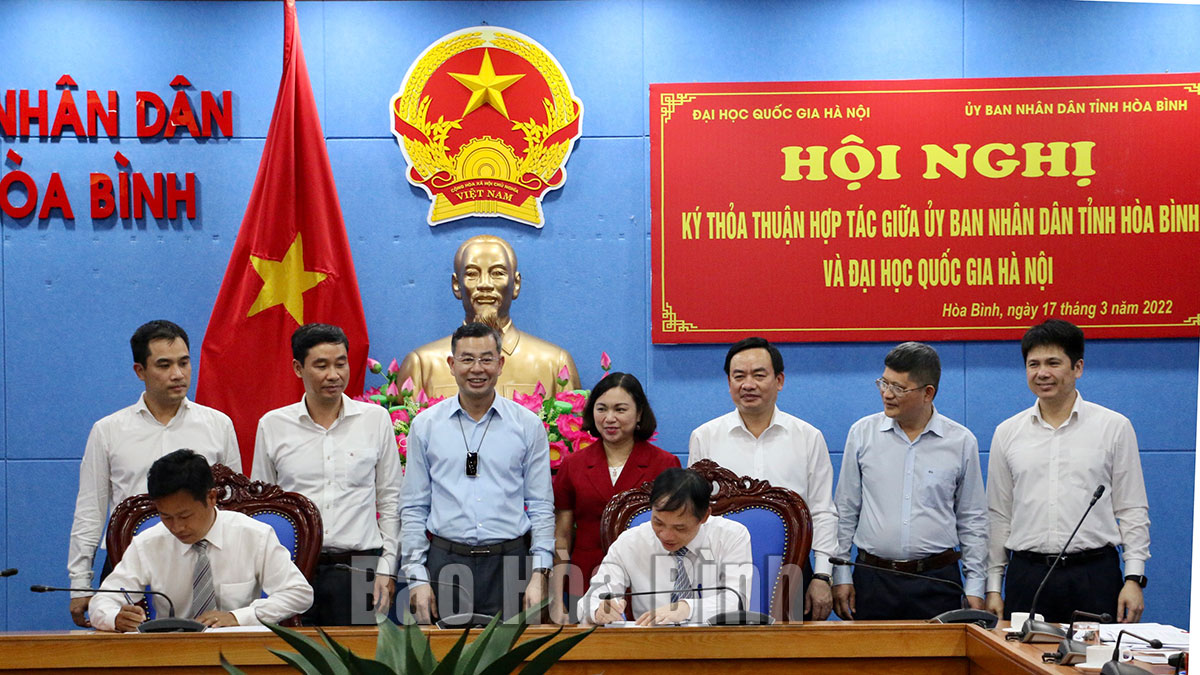
(HBO) – The Hoa Binh provincial People’s Committee and the Vietnam National University, Hanoi (VNU) on March 17 signed an agreement on training, scientific research, and technology transfer cooperation for the 2021 - 2025 period.
Secretary of the provincial Party Committee Ngo Van Tuan, member of the Party
Central Committee and head of the National Assembly deputies’ delegation of Hoa
Binh,and other delegates witness the agreement signing between the
provincial People’s Committee and the VNU.
The two sides identified three focuses of their
cooperation, namely human resources training and development, scientific
research and technology transfer, and socio-economic development policy
consulting.
Witnessing the signing, Secretary of the
provincial Party Committee Ngo Van Tuan stressed that Hoa Binh is applying
itself to making four strategic breakthroughs (planning, administrative reform,
infrastructure development, and human resources quality improvement) while
setting up targets and devising strong measures relevant to the four main
pillars of clean agriculture, high-value support industries, capitalisation of
its close proximity to Hanoi capital, and the abundant workforce. It is also
working to make use of local natural resources, beautiful landscapes, and the
culture deeply imbued with ethnic groups’ identities to develop tourism.
He expressed his hope the cooperation will
generate sustainable and long-term benefits for both sides, and that the VNU
will substantially assist Hoa Binh in the three important areas of human
resources training and development, science - technology, and policy
consulting.
VNU Director Prof. and Dr. Le Quan pledged to
provide high-level training courses to the province's order; create favourable
conditions for local cadres to engage in training and researches; coordinate to
transfer scientific - technological advances in terms of planning, tourism, and
environmental protection; and carry out other activities requested by the
provincial People’s Committee and match the VNU’s functions.
At the event, participants also discussed
cooperation orientations and activities for 2022 and 2023. Concluding the meeting, Bui Van Khanh, Vice
Secretary of the provincial Party Committee and Chairman of the provincial
People’s Committee, voiced his hope that this partnership will contribute to
socio-economic development of Hoa Binh./.
Hoa Binh province is undergoing a dynamic transformation amid Vietnam’s national digital transition. Building on Poliburo’s Resolution No. 57-NQ/TW on breakthroughs in science, technology, innovation, and national digital transformation, the province has rolled out a wide range of practical action plans. A standout initiative is the "Digital Literacy for All” movement, an effort to ensure that no one is left behind in the digital era.
Hoa Binh province is undergoing a dynamic transformation in the wake of the national digital transformation movement. Building on Resolution No. 57-NQ/TW of the Politburo on breakthroughs in science, technology, innovation, and national digital transformation, the province has implemented a wide range of practical action plans. A standout initiative is the "Digital Literacy for All” movement ambitious effort to ensure that no one is left behind in the digital age.
With a spirit of unity and proactive problem-solving, the Party Committee, the government and the people of Dong Lai Commune (Tan Lac District) have made great strides in implementing the resolutions of the 24th Party Congress of the commune for the 2020 - 2025 term. Focusing on leadership and practical actions, the commune has brought the Party’s resolutions into daily life, creating strong impacts and pushing the local development forward.
Amid the nationwide push for digital transformation, young people in Hoa Binh Province are stepping up as dynamic pioneers, applying technology to enhance Youth Union operations and expand the reach of youth-led initiatives. Through creativity and adaptability, Youth Union organizations at all levels have introduced a series of practical solutions, contributing to modern governance and community development.
In recent years, An Nghia commune, located in Lac Son district, has stepped up administrative reform, focusing on improving the quality and efficiency of its single-window service unit for receiving and processing administrative procedures. These improvements have helped create favourable conditions for local residents and organisations to handle administrative procedures, contributing to the commune’s broader socio-economic development.
The Prime Minister-approved master plan to develop the multi-use value of forests ecosystems through 2030, with a vision to 2050, aims to improve the management and sustainable use of forest resources, create jobs, increase incomes, and improve the living standards of ethnic minorities, people in mountainous and remote areas, forest workers and those living near forests.



